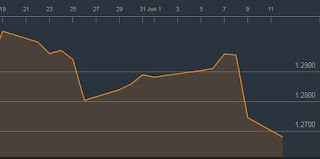The pound's woes will continue ...
Last week saw a number of events that could be calamitous for individual currency pairs. None were more high profile than the 2%+ drop in the value of the pound sterling in the wake of the shockingly-if-you-follow-the-pundits, unsurprisingly-if-you-know-how-survey-methodology-works results of the UK parliamentary election.
In short - Theresa May's Conservative Party lost seats and significantly weakened the country's ability to negotiate favorable terms for Brexit.
The pound's mild crash was obvious and fitting considering the result, however the worst may be yet to come.
Pound sterling saw a massive drop post-Brexit vote, losing more than 20% of its value vs USD as investors anticipated an economic slowdown and a loss of faith in the stability of one of the world's major financial centers. Much of this was based on a risk off attitude - If you're managing other people's money for a living or an executive at a multinational corporation, you probably didn't get where you are by making uninformed decisions.
The problem with Brexit is not so much the nuts and bolts effect it will have on the British economy - it won't be good but globalization is so inevitable and difficult to slow, much less reverse, that in the long run we'll probably see a return to normal trade relations. It may not be a return to the EU in name but in function it's almost inevitable.
Instead, the issue is uncertainty. No one really knows what's going to happen now. Will May stay on as PM? Will another election lead to an even greater shift in the makeup of the government? How will Brexit negotiations be handled now that a coalition of the young and urban has provided an at least mild rebuke to last year's vote?
Until we can answer these questions with some level of confidence, foreign investment will drop off. So will the value of the pound.
Great news if you're planning a trip to London or own a machinery importing business, not so much if you're American company selling into the UK.
In short - Theresa May's Conservative Party lost seats and significantly weakened the country's ability to negotiate favorable terms for Brexit.
The pound's mild crash was obvious and fitting considering the result, however the worst may be yet to come.
 |
| GBP/USD, last three weeks. Notice the sharp downturn post-election. |
Pound sterling saw a massive drop post-Brexit vote, losing more than 20% of its value vs USD as investors anticipated an economic slowdown and a loss of faith in the stability of one of the world's major financial centers. Much of this was based on a risk off attitude - If you're managing other people's money for a living or an executive at a multinational corporation, you probably didn't get where you are by making uninformed decisions.
The problem with Brexit is not so much the nuts and bolts effect it will have on the British economy - it won't be good but globalization is so inevitable and difficult to slow, much less reverse, that in the long run we'll probably see a return to normal trade relations. It may not be a return to the EU in name but in function it's almost inevitable.
Instead, the issue is uncertainty. No one really knows what's going to happen now. Will May stay on as PM? Will another election lead to an even greater shift in the makeup of the government? How will Brexit negotiations be handled now that a coalition of the young and urban has provided an at least mild rebuke to last year's vote?
Until we can answer these questions with some level of confidence, foreign investment will drop off. So will the value of the pound.
Great news if you're planning a trip to London or own a machinery importing business, not so much if you're American company selling into the UK.
Comments
Post a Comment